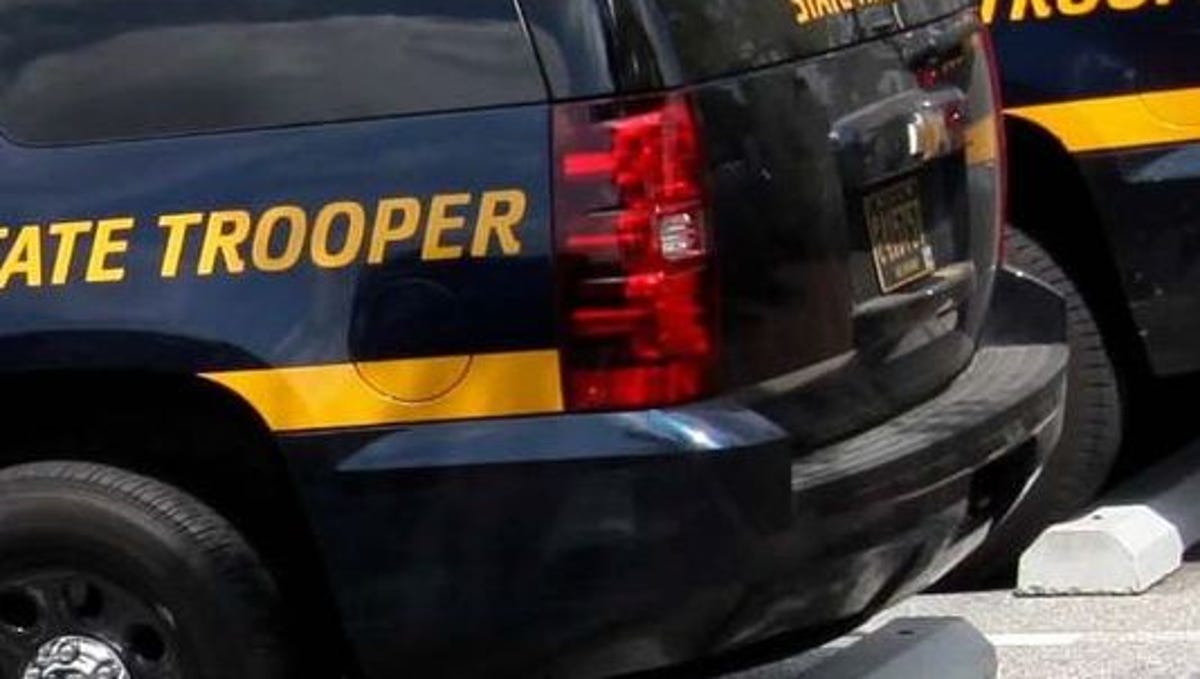Politics
Decoding Trump: How he engaged, deflected or ducked my questions at Mar-a-Lago
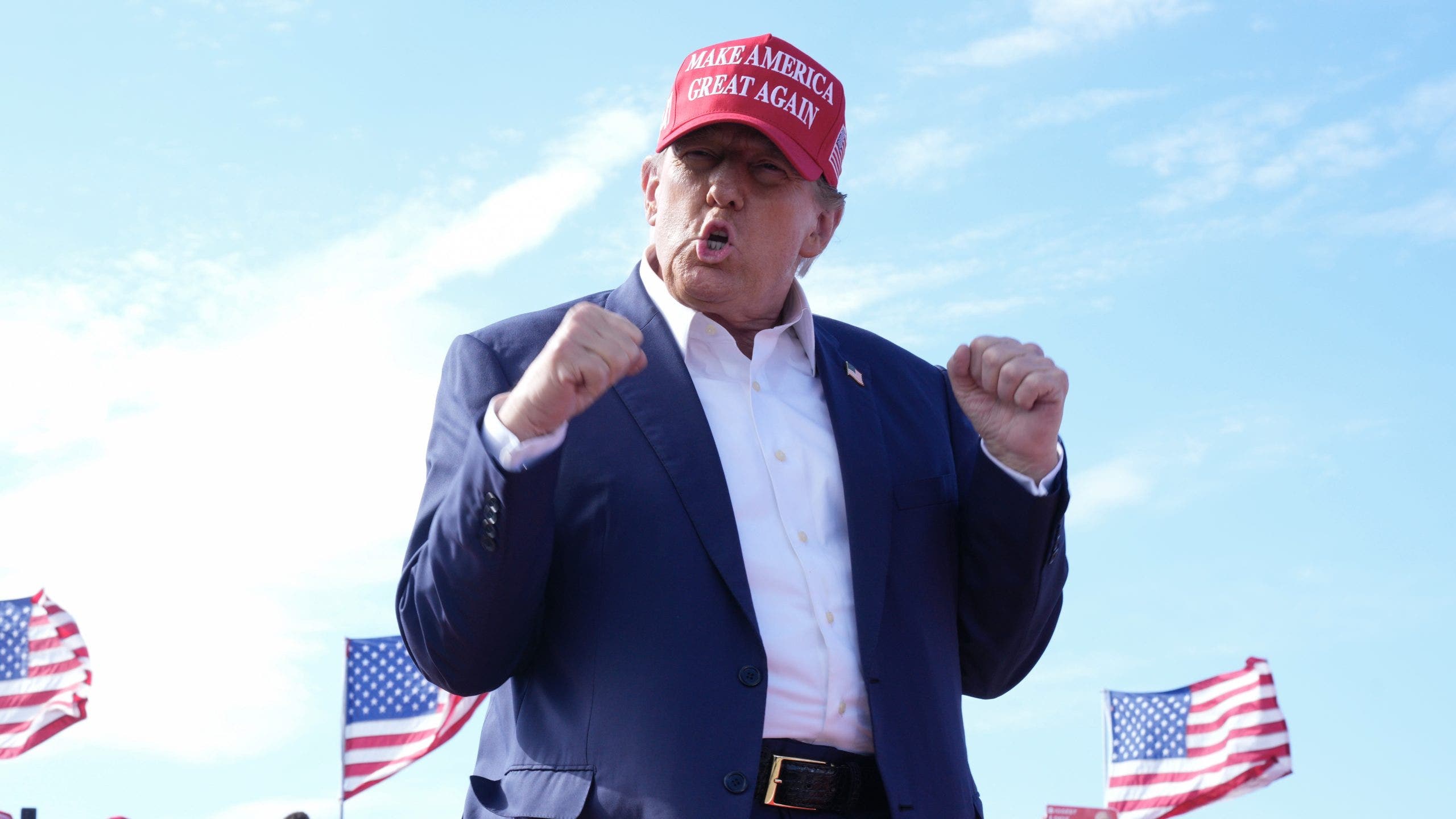
I came armed with a fistful of blue cards, and still didn’t get to half the questions, but Donald Trump made a whole lot of news in our Mar-a-Lago interview.
What’s revealing is how he chose to answer the most sensitive questions, or to deflect them, and how various media outlets chose to frame them.
Some, like the New York Times, ABC and the Hill, played it straight. Other operations, many of them left-leaning, cherry-picked quotes to make Trump look as awful as possible, while ignoring the reasonable-sounding things he said.
A classic example was when I asked the former president about the murder of Alexei Navalny in a Siberian prison camp. I thought he might duck because of his friendly relationship with Vladimir Putin.
But I put it to him point-blank: Is the Russian dictator responsible for the death of the opposition leader?
TRUMP: IF YOU’RE GOING TO BAN TIKTOK, BAN FACEBOOK TOO
Republican presidential candidate and former President Donald Trump takes the stage to introduce a new line of signature shoes at Sneaker Con at the Philadelphia Convention Center on Feb. 17 in Philadelphia, Pennsylvania. (Chip Somodevilla/Getty Images)
“Perhaps,” Trump said. “I mean, possibly, I could say probably. I don’t know. He’s a young man, so statistically he’d be alive for a long time…Certainly that would look like something very bad happened.”
Keep in mind that Trump has never even mentioned Putin in the same paragraph as Navalny, and now he’s saying “probably” responsible. Of course, Trump can’t prove it, and neither can I.
Here are some of the headlines:
“Trump Couldn’t Bring Himself to Condemn Putin for Alexei Navalny’s Death.”
“Trump Delivers Head-Spinningly Awkward Answer to New Question About Putin.”
“Trump: ‘I Don’t Know’ If Putin Was Responsible for Navalny’s Death.”
You get the idea.
Which brings us to Trump’s rhetoric. I asked why he uses words like “vermin” and “poisoning of the blood” to describe illegal migrants – especially since the press says such language was used by Hitler and Mussolini.
Trump says he didn’t know that and then repeated “our country is being poisoned” – prompting a wave of headlines that he had doubled down on such harmful language.
TRUMP: BIDEN IS ‘BAD FOR ISRAEL’
I guess you could say that – and I’m not letting him off the hook – but the more telling part of his answer came next.
I asked the 45th president whether he uses “over the top” and “inflammatory” language to drive the media debate, meaning a focus on his words gets news outlets spending days on his turf, on his preferred issue, in the arguments over whether he went too far. And Trump didn’t deny it, saying he wouldn’t limit himself to “politically correct” verbiage.
“It also gets people thinking about very important issues,” he said. “That if you don’t use certain rhetoric, if you don’t use certain words that maybe are not very nice words, nothing will happen.” My theory, based on decades of observing him, was correct.
Then he went off on migrants coming from insane asylums and how crime will double – neither of which has been shown to be true on a major scale.
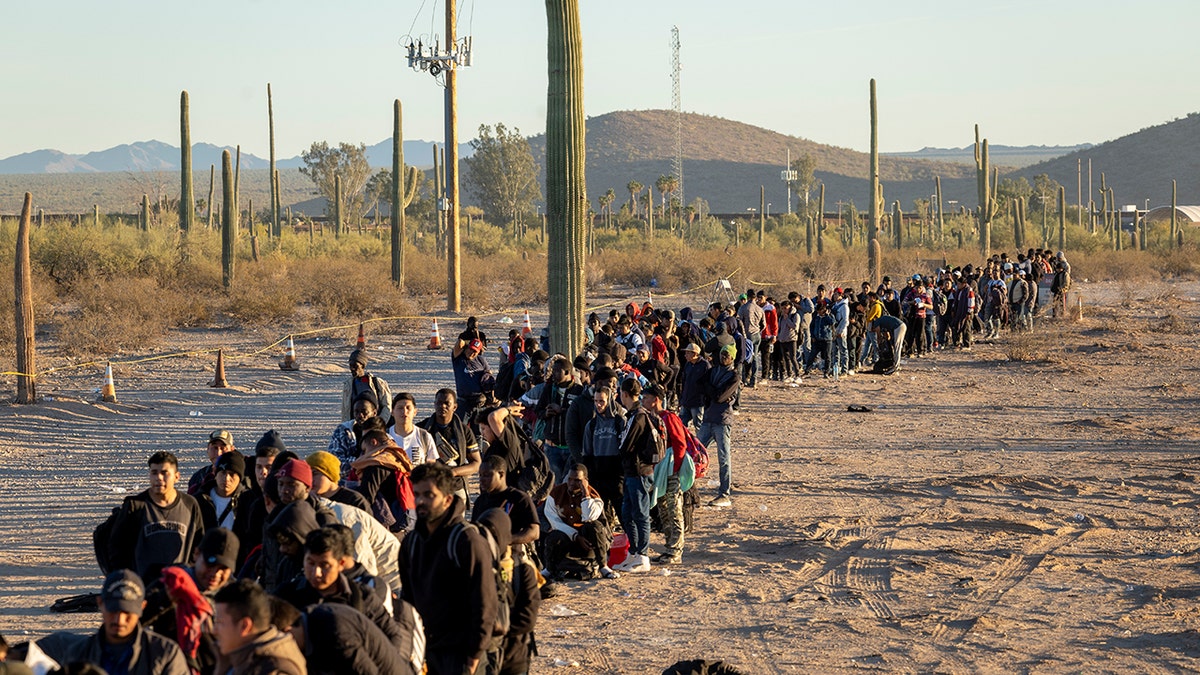
Migrants line up at a remote U.S. Border Patrol processing center after crossing the U.S.-Mexico border on Dec. 7, 2023, in Lukeville, Arizona. (John Moore/Getty Images)
The same was true with NATO, when Trump caused a global uproar by saying he’d encourage the Russians to “do whatever the hell they want” to NATO countries that don’t pay their fair share of defense costs.
That sounds like someone taking a pro-Putin stance, I said.
“It sounds like somebody that wants to get people to pay money,” Trump said. In other words, it was a negotiating tactic.
Half an hour before airtime, the media were awash in headlines about Trump saying there would be a “bloodbath” if he lost the election. So I watched that portion of his speech at an Ohio rally the night before.
There have been times when Trump used loaded words to signal the possibility of political violence. This wasn’t one of them.
TRUMP: I’LL DEBATE BIDEN ‘ANYTIME, ANYPLACE’
Trump was going on about Chinese cars and their impact on the American auto industry. Then he said if he wasn’t elected there would be a bloodbath – in terms of the impact on jobs. Then he went right back to talking about electric vehicles and industry competition.
Now some pundits said the mere use of the word bloodbath was like a bat signal, telling his supporters to get ready for violence. After all, he was so Machiavellian that he added, “That’s going to be the least of it.” But as I said, too many outlets were so in love with the bloodbath story that they wrenched it out of context.
Trump also said at the rally that some migrants were “animals” and “not people.” That’s unacceptable language, in my view, but remember what he said about inflammatory words driving the media debate. I wanted to decode his approach for viewers.
Trump also made news on abortion. I asked him about a Times story that said he is discussing with advisers a national ban after 16 weeks of pregnancy – not knowing his campaign had dismissed it as fake news – and figured he’d dismiss the story.

Migrants who crossed the Rio Grande and entered the U.S. from Mexico are lined up for processing by U.S. Customs and Border Protection on Sept. 23, 2023, in Eagle Pass, Texas. (AP Photo/Eric Gay, File)
Nope. He essentially confirmed the 16-week story – saying he’d make a decision “pretty soon,” which would obviously be in that range – that had previously been attributed to unnamed sources. He said, despite my skepticism, that he wants to “make both sides happy.”
When Republicans grapple with abortion in the post-Roe world, Trump said, “you have to go with your heart. But beyond that, you also have to get elected.” He said that opposing the three exceptions – rape, incest, life of the mother – caused Pennsylvania Republican Doug Mastriano to lose the governor’s race in a landslide.
Then Trump went off on the Democrats and late-term abortions – which I said in one of several fact-checks are exceedingly rare.
He also made news on subjects ranging from Israel to TikTok.
The first time I met Donald Trump was in 1987, in New York, when he was promoting his first book “The Art of the Deal.”
And this, unprompted, is what he said to me:
“When I go up to New Hampshire – I’m not running for president, by the way – I got the best crowd, the best of everything in terms of reception. The politicians go up and get a moderate audience. I go up and they’re scalping tickets. You heard that? They’re scalping tickets. Why? Because people don’t want to be ripped off, and this country is being ripped off. I think if I ran, I’d win.”
I confess I did not then envision Trump, still a largely local real estate guy, in the White House, but now he’s going to head the Republican ticket for the third straight time.

Politics
Park Police union says officers ‘did everything they could’ during DC anti-Israel riot

Following the protests at Union Station by anti-Israel agitators defacing federal property in protest of Israeli Prime Minister Benjamin Netanyahu’s address to Congress, a Park Police union is pushing back against criticism that only a few arrests were made.
Thousands of Hamas-sympathizing agitators descended on Washington, D.C., Tuesday, at one point defacing federal monuments with phrases in support of the terrorist group responsible for the Oct. 7 attacks in Israel, saying, “Hamas is coming.”
Twenty-three people were arrested at the protests, but some have suggested that number should have been higher.
Sen. Marco Rubio, R-Fla., posted on X, “How many more times are they going to allow leftist degenerates who support terrorism and hate America to vandalize property and attack police? There should have been hundreds of arrests today in D.C. not just 23.”
HOUSE REPUBLICANS REPLACE AMERICAN FLAGS AT UNION STATION AFTER ANTI-ISRAEL PROTESTS
The Columbus Memorial Fountain at Union Station during an anti-Israel protest on the day Israeli Prime Minister Benjamin Netanyahu addressed a joint meeting of Congress on Capitol Hill in Washington July 24, 2024. (Reuters/Seth Herald)
But the U.S. Park Police Labor Committee is pushing back.
“Our officers on the ground did everything they could to protect life and property. In fact, despite having only 29 officers available to mitigate damage — 29! — with no additional help from the Department of the Interior, we processed several arrests for charges ranging from assault on a police officer to destruction of government property,” Kenneth Spencer, chairman of the United States Park Police Fraternal Order of Police, said in a statement.
“That’s why it’s so disheartening to hear some members of Congress and members of the media, many of whom describe themselves as ‘champions’ of law enforcement, suggesting that officers gave protesters a ‘pass’ or that insufficient arrests were made.
“Nothing could be further from the truth. Anyone who truly cares to understand the problem would see that our officer staffing crisis is at the root of our agency’s mission readiness. A small unit of 29 officers arrested 10 individuals while being assaulted by a mob of thousands. We simply did not have the staffing or resources to accomplish a mass arrest operation.”
SEE IT: THE MOST DRAMATIC PHOTOS FROM WEDNESDAY’S PRO-HAMAS WASHINGTON, D.C. PROTESTS
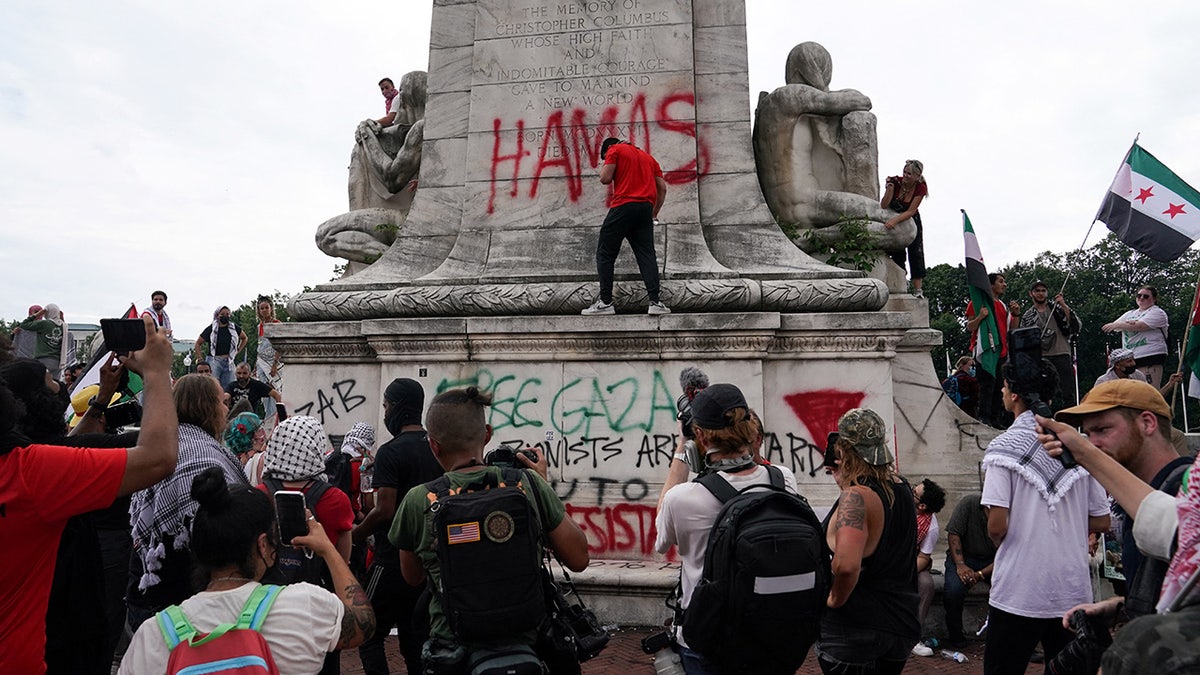
An anti-Israel demonstrator sprays graffiti on the Christopher Columbus Memorial Fountain at Union Station on the day of Israeli Prime Minister Benjamin Netanyahu’s address to a joint meeting of Congress on Capitol Hill in Washington July 24, 2024. (Reuters/Nathan Howard)
At least one demonstrator, whose face was covered, was spotted by Fox News carrying what appeared to be the flag of the terrorist group Hamas while others were heard shouting “Allahu Akbar.”
KAMALA HARRIS REACTS TO ANTI-ISRAEL RIOTS AT DC’S UNION STATION
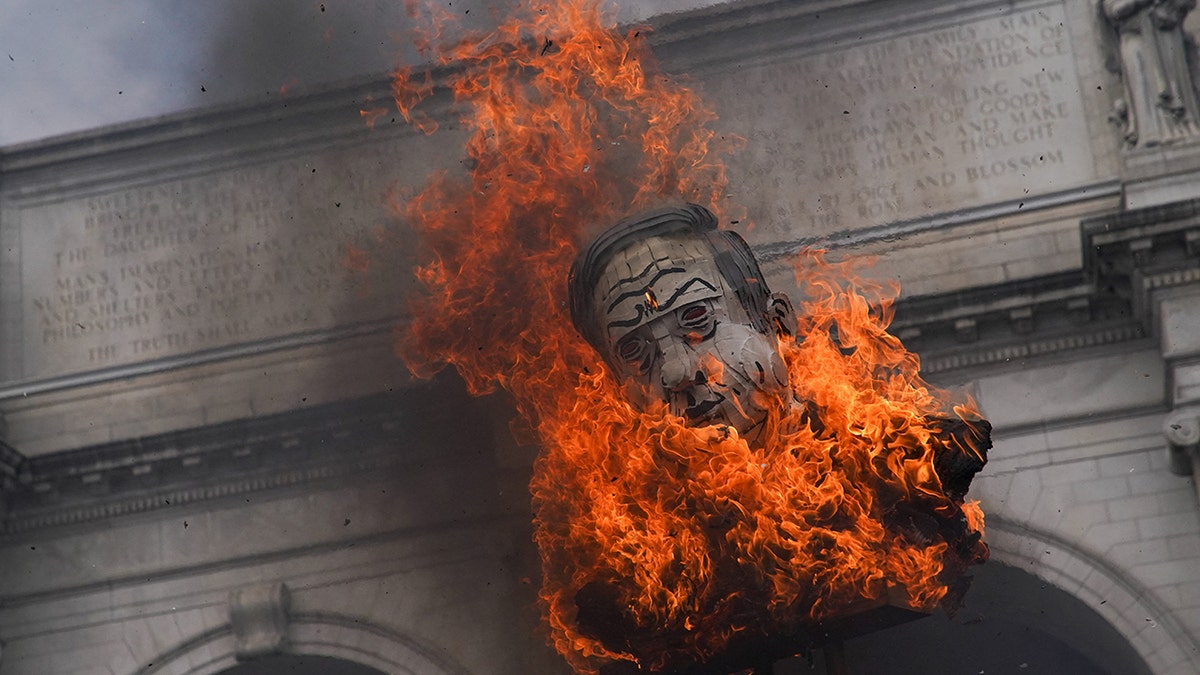
Anti-Israel demonstrators burn an effigy depicting Israeli Prime Minister Benjamin Netanyahu outside Union Station on the day of Netanyahu’s address to a joint meeting of Congress on Capitol Hill in Washington July 24, 2024. (Reuters/Nathan Howard)
The White House condemned the protests Wednesday evening, calling the chaos “disgraceful.”
“Identifying with evil terrorist organizations like Hamas, burning the American flag or forcibly removing the American flag and replacing it with another is disgraceful,” White House spokesperson Andrew Bates said in a comment to Fox News Digital Wednesday evening.
Politics
Ali: Kamala Harris has a campaign soundtrack: Beyoncé's 'Freedom'
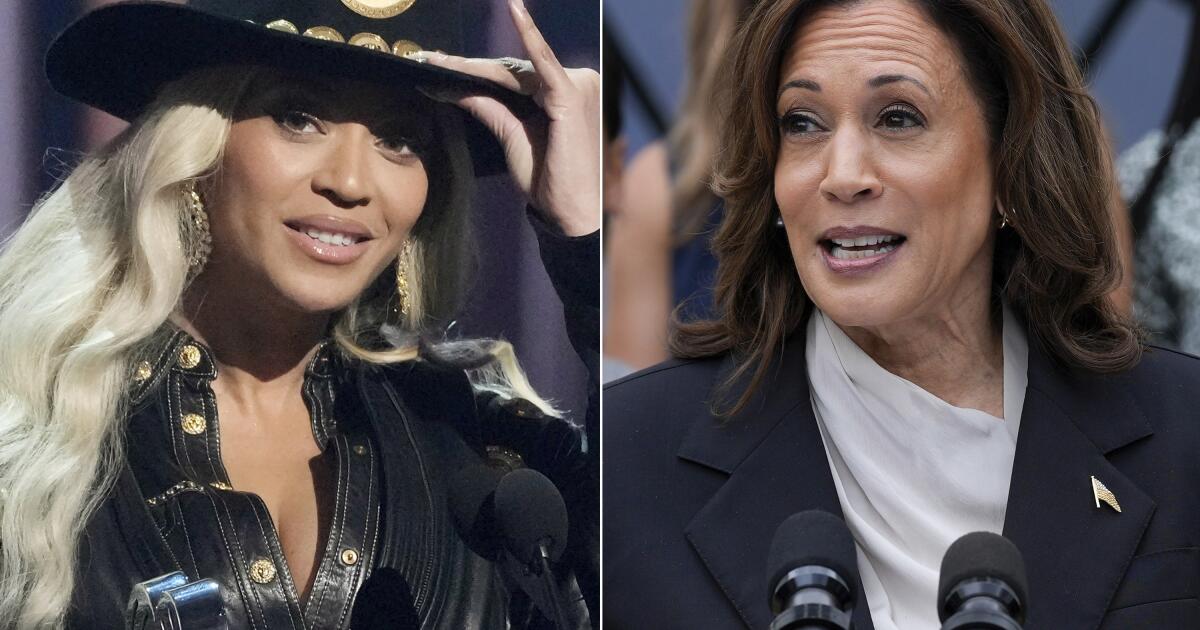
Vice President Kamala Harris’ bid for the presidency has a soundtrack: Beyoncé’s “Freedom.”
The leading Democratic presidential candidate took the stage in her first visit to her Wilmington, Del. campaign headquarters and again during her first campaign rally in Wisconsin as the song played.
Now the cathartic anthem graces Harris’ first campaign ad, in which she says: “There are some people who think that we should be a country of chaos, of fear, of hate. But us? We choose something different: We choose freedom.”
Pit that against the musical number her competitor chose for his grand entrance on Night 3 of the Republican National Conference. Donald Trump walked out to James Brown’s “It’s a Man’s, Man’s, Man’s World,” a tone-deaf choice for a former president found liable for sexual abuse, who’s bragged about sexually assaulting women, a married man who paid hush money to a porn star and a former president who rolled back women’s reproductive rights 50 years with the repeal of Roe vs. Wade.
Maybe the Godfather of Soul would have endorsed Trump’s usage of his song, but Brown would be breaking with decades’ worth of musicians who’ve decried GOP candidates playing their tracks at rallies and booster events. Adele, Rihanna, R.E.M., the Rolling Stones, Prince, Neil Young, Guns N’ Roses and Queen are among the many artists who’ve spoken out against Trump using their tunes for campaign purposes.
Heart bristled when the McCain-Palin campaign used “Barracuda.” Tom Petty insisted George W. Bush back away from “I Won’t Back Down.” Bruce Springsteen decried Ronald Reagan’s appropriation of “Born in the U.S.A.”
Beyoncé, however, gave Harris her blessing to use “Freedom,” a single from her 2016 blockbuster album “Lemonade.” The song, which features guest rapper Kendrick Lamar, is an explosive expression of empowerment. At the time of its release, it spoke to public outcry around police killings of unarmed Black men and women — Eric Garner, Tamar Rice, Freddie Gray — and protests that were largely fueled by the ire of younger generations.
Whether Beyoncé was singing about the tyranny of a cheating spouse or racial injustice (or both), the song became an anthem for a new, potentially potent block of the American electorate.
For the first time, Gen Z and millennials could now account for as many votes as baby boomers and their elders, groups that have made up a majority of the electorate for decades.
Folks under 40 have grown up with Beyoncé and her ubiquitous work. Think of Beyoncé like the Who for boomers — their work is everywhere (Republican Sen. Rand Paul played the band’s anti-war hit “Baba O’Riley” when he campaigned in 2015) — or Nirvana for Gen X, except no one cares what we think. Whatever, nevermind.
The Harris campaign’s smart choice of music coincides with a willingness to lean into a meme culture that shot up organically around the 59-year-old VP since President Biden announced Sunday that he was dropping out of the race.
Pop star Charli XCX showed her support for Harris when she tweeted “Kamala IS brat.” The British singer is referring to the TikTok and Twitter edits of Harris’ image superimposed to songs from Charli XCX’s hit album “Brat.” The avalanche of memes come from a video clip in which Harris talks about her mother’s response to the hubris of youth: “You think you just fell out of a coconut tree? You exist in the context of all in which you live and what came before you.”
Right-wing social media used the quote to deride Harris as inarticulate and a “word salad” master, but liberal swaths of Gen Z have since reworked the clip into emojis and memes that celebrate Harris’ nonconformist approach. She’s become a viral sensation, in a good way, unlike J.D. Vance’s damning “single cat lady” memes and a cringey internet joke about encounters with couches.
It’s rare that relevant talent will shill for a Republican candidate. Case in point: Trump’s pop culture ambassadors at this year’s RNC were Kid Rock, Kanye’s ex Amber Rose and former WWE wrestler Hulk Hogan, whose big moment was ripping his shirt off and screaming “Let Trump mania run wild!”
Harris chose to let freedom ring, and she has Queen Bey behind her.
Politics
Texas sues Biden administration over program giving birth control to teens without parents' knowledge

Texas officials are challenging a recent order from President Biden’s administration that would allow schools to distribute birth control to teenagers without parental consent.
Texas Attorney General Ken Paxton announced Thursday that his office is suing the Biden administration over their 2021 change to Title X guidelines banning parental consent requirements for birth control services.
“By attempting to force Texas healthcare providers to offer contraceptives to children without parental consent, the Biden Administration continues to prove they will do anything to implement their extremist agenda — even undermine the Constitution and violate the law,” Paxton said in a statement.
TRUMP SAYS HE ‘WILL NEVER ADVOCATE IMPOSING RESTRICTIONS ON BIRTH CONTROL’ OR OTHER CONTRACEPTIVES
A woman takes the next pill from a monthly pack of contraceptive pills. (Annette Riedl/picture alliance via Getty Images)
The Texas legal battle began in Dec. 2021 when US District Judge Matthew Kacsmaryk ruled that Title X — the federal program that provides free, confidential contraception to anyone regardless of age, income or immigration status — violates parental rights and violates state and federal laws.
The case was argued by former solicitor general of Texas Jonathan Mitchell, representing father Alex Deanda, who said he was “raising each of his daughters in accordance with Christian teaching on matters of sexuality, which requires unmarried children to practice abstinence and refrain from sexual intercourse until marriage.”
SCHUMER PLANS VOTE ON ‘CONSTITUTIONAL RIGHT TO CONTRACEPTION’ IN BID TO PROTECT SENATE DEMOCRAT MAJORITY
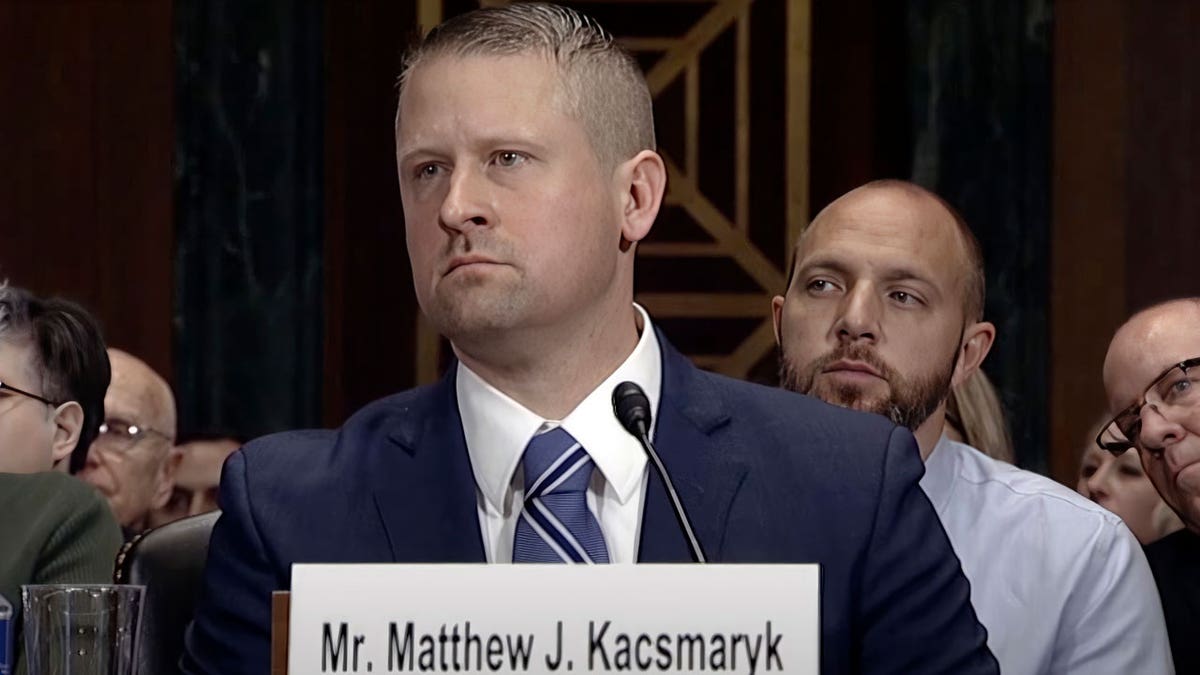
Kacsmaryk, a Trump appointee, previously ruled that parents must be informed when birth control is provided to their children under 18 years old. (Senate Judiciary Committee via AP)
In response, the federal government updated guidelines to state that Title X projects “may not require consent of parents or guardians for the provision of services to minors, nor can any Title X project staff notify a parent or guardian before or after a minor has requested and/or received Title X family planning services.”
Paxton is now seeking a permanent injunction on this rule, which he claims defies the findings of the federal court.
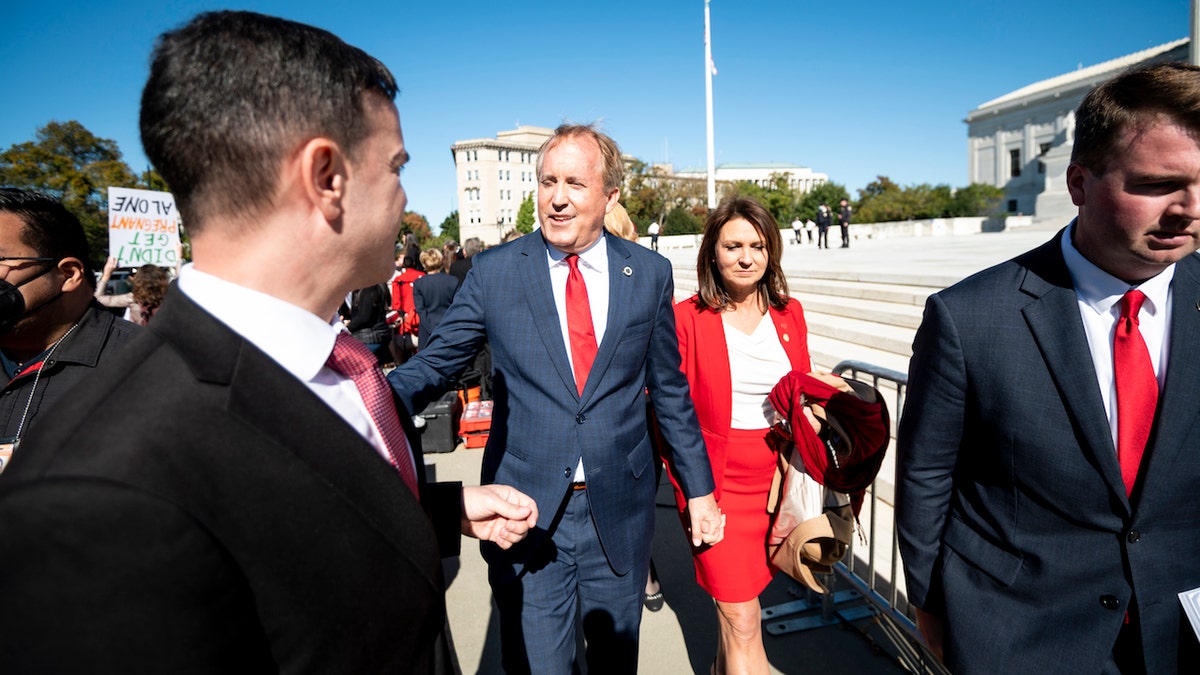
Paxton and his wife Angela are pictured outside the Supreme Court. (Bill Clark/CQ-Roll Call, Inc via Getty Images)
Paxton filed the lawsuit in a federal court in Amarillo. It will likely be heard by Kacsmaryk, the same judge who previously ruled parents must be informed of birth control provided to their children.
-

 World1 week ago
World1 week agoOne dead after car crashes into restaurant in Paris
-

 Midwest1 week ago
Midwest1 week agoMichigan rep posts video response to Stephen Colbert's joke about his RNC speech: 'Touché'
-

 News1 week ago
News1 week agoVideo: Young Republicans on Why Their Party Isn’t Reaching Gen Z (And What They Can Do About It)
-

 Movie Reviews1 week ago
Movie Reviews1 week agoMovie Review: A new generation drives into the storm in rousing ‘Twisters’
-

 News1 week ago
News1 week agoIn Milwaukee, Black Voters Struggle to Find a Home With Either Party
-

 Politics1 week ago
Politics1 week agoFox News Politics: The Call is Coming from Inside the House
-

 News1 week ago
News1 week agoVideo: J.D. Vance Accepts Vice-Presidential Nomination
-

 World1 week ago
World1 week agoTrump to take RNC stage for first speech since assassination attempt




